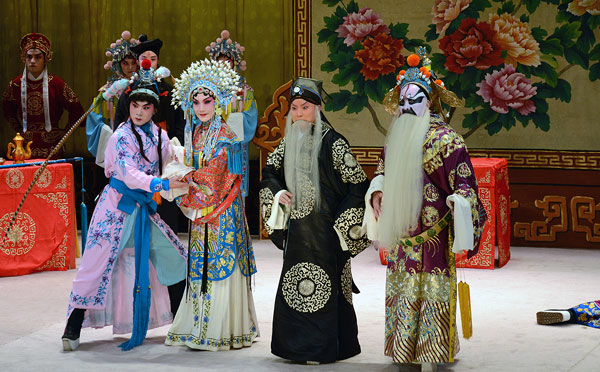'Big' Peking opera staged in New York
Updated: 2014-12-08 10:37
By NIU YUE in New York(China Daily USA)
|
|||||||||||
 |
|
The Orphan of Zhao, one of the major classics of Peking Opera, is staged at the Michael Schimmel Center for the Arts at Pace University on Dec 7. LU HUIQUAN/FOR CHINA DAILY |
The Orphan of Zhao, one of the major classics of Peking Opera, is staged at the Michael Schimmel Center for the Arts at Pace University on Dec 7.
It's something of a rarity in New York City — an audience of 700 giving a standing ovation to a performance of traditional Peking Opera. But it could be catching on.
"Absolutely fantastic!" Miao Hejun, 69, a Chinese immigrant who has been living in the US for more than 20 years, said after watching the New York Chinese Opera Society (NYCOS) staging of The Orphan of Zhao on Dec 6 at Pace University.
"Shows like this are not as common as they used to be," Miao said.
NYCOS, founded in 2006, is a non-profit organization dedicated to preserving and promoting traditional Chinese Opera. Most of NYCOS' 200 members have professional training in Peking Opera but have other full-time jobs.
The Orphan of Zhao is one of the classics of Peking Opera's 200-year-old repertoire and the flagship work of this year's annual Winter Culture Exchange Festival.
It took NYCOS more than two months of rehearsal to stage the work, but the whole process took nearly a year, from selecting which opera to perform to logistics and recruiting the best performers.
"It's a big production," said Daniel Yu, treasurer of NYCOS.
The show features a palace struggle in the Kingdom of Jin more than 2,500 years ago. Zhao Dun, a righteous minister, fell out of favor with the fatuous king. His family was exterminated by his political rival, Tu Angu. Only the infant Zhao Wu survived and to keep the baby safe, Doctor Cheng Ying smuggled him out of the palace, offering up his own child as the wanted infant. Many other people sacrifice their lives to protect the baby.
After three hours of intrigue and drama, the opera ends with a grown Zhao Wu killing Tu Angu with the help of Cheng and General Wei Jiang, two roles played by top artists from China, Zhang Jianguo and Yang Yanyi.
"We see more people in the audience this year than in the past," said Zhang, who has worked with NYCOS twice before, "and NYCOS performers are getting more and more professional."
The story explores several traditional Chinese values, such as loyalty and righteousness, said Chi K. Chu, president of NYCOS. "For a just cause, Cheng sacrifices his own child to keep the descendant of a righteous man," he said. "That's righteousness, that's Chinese culture."
The play was performed in Chinese with English subtitles and there were dozens of non-Chinese-speakers in the audience.
"This was a really unique experience for me," said Kristen Bulatovic, who was seeing Peking Opera for the first time. "I loved the make-up, costumes and the movements of the characters. It was also great to feel the involvement of the audience and how they reacted."
Apart from the festival, NYCOS also offers courses in Chinese calligraphy and basic Peking Opera and stage performance. In 2012, NYCOS developed a youth troupe, which now has some 50 members, to train younger performers and build interest in Peking Opera among the next generation.
"Many people are eager to learn Western classical arts," said Ma Bin, head of the youth troupe, "but it is easier to learn Chinese traditional culture, because it is your mother language and you know the culture."
While NYCOS is thriving thanks to some 35 sponsors, most of which are foreign companies, many Peking Opera troupes in New York have lowered their curtains in recent years due to falling viewership and lack of funds.
"I would hope that corporations support local communities, as they make money from them," said Chu. "Given the fact that China is the world's second-largest economy, it is vital to make traditional Chinese culture part of the mainstream."
Han Yunru, a performer with NYCOS' youth troupe and a PhD candidate at Columbia Business School, said "you may not have access to it, but once you see it, you might find yourself addicted".
Zhang said China is already encouraging Peking Opera artists to reach out to schools, and schools are encouraged to have Peking Opera classes. As more Chinese-speaking people enjoy the traditional art, Yu predicts, they may bring more foreigners to its fan base.
Lu Huiquan in New York contributed to this story.
Related Stories
Peking Opera honored in DC 2014-08-27 11:15
Performance in Times Square to commemorate Beijing Opera legend 2014-08-19 23:41
Bold plan for $1.2 billion opera house on the Perth waterfront 2014-05-01 15:45
Stephen Chow retrospective set for NYC 2014-09-30 06:49
Chinese American to run NYC public schools' fund 2014-09-01 05:07
Ancient Chinese folktale returns to NYC 2014-07-01 11:38
Today's Top News
Former French PM celebrates China Daily's Climate Watch debut
Chinese help sought in UK name game
US, Britain pledge to support Afghanistan
HK visit: A political kabuki
Ukraine unlikely to join NATO in near future
Hotpot chain to raise $129m
2014 likely to be record warmest year
Ukraine's ceasefire talks continue
Hot Topics
Lunar probe , China growth forecasts, Emission rules get tougher, China seen through 'colored lens', International board,
Editor's Picks

|

|

|

|

|

|





